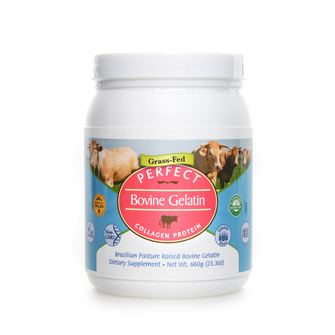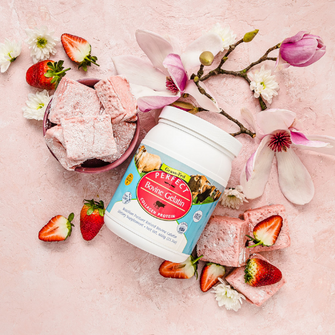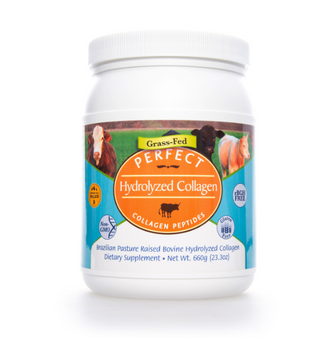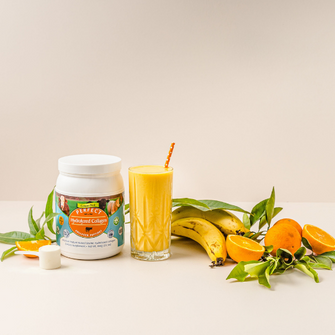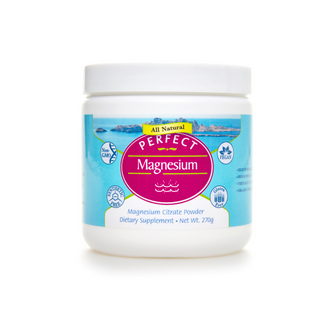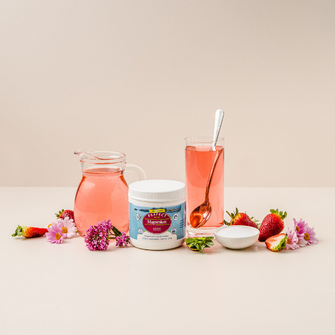Since the FODMAPs diet for IBS was developed by researchers at Monash University in Australia, it's helped countless people suffering from this chronic, debilitating gastrointestinal condition. In fact, 1 in 7 adults suffer from IBS, and I am one of them.

How is IBS Diagnosed?
Well, believe it or not, it isn't through a colonoscopy! Nope, a colonoscopy won't show any sign of IBS but a doctor can diagnose you by looking at the following things:
- Your medical history
- Your symptoms
- Your genetics
- They may offer a physical exam?
- They may suggest a gluten-intolerance test to rule out coeliac disease
For over two decades, I have suffered from the bloating, lower abdominal pain, distension and irregular bowel habits that are common symptoms of IBS. I was diagnosed years ago while nannying in the U.K and tried my best to manage my condition with diet, supplementation (hydrolyzed collagen, magnesium, prebiotics and probiotics), meditation etc..
However, an incredibly painful incident that occurred after I recently ate the pseudo-grain millet prompted me to adopt the FODMAPs diet for IBS.
Note: millet is not high FODMAP, I just cannot tolerate it, quinoa has the same effect for me. Just because something is gluten-free that doesn’t mean it may be right for you either? And various FODMAP foods can be the same.
I'd heard about this diet many years ago, but I fobbed it off (or should I say fodd'd LOL) and all these years later felt compelled to try it...
It’s only been a week, and I already feel better. My so-far-success prompted me to write this blog, and hopefully, help other people who may be suffering.
BLOG UPDATE: since starting this blog, I have now learned that a Low-FODMAP diet is not really a gut-healing diet as it does not address the root cause of gut issues (imblanced gut flora and leaky gut). The only diet that I am aware of that truly heals the gut, is the GAPS diet but this diet is not for the faint-hearted!
GAPS is an intensive protocol developed by a doctor (Natasha Campbell-McBride) and has literally helps thousands of people to heal their gut lining and gut microbiome.
Healing these two things can help to heal other chronic health issues, issues such as allergies, arthritis, asthma, autism, autoimmune diseases, blood sugar issues, chronic gut issues, dyslexia, dyspraxia and many mental health issues such as depression and even schizophrenia.
Our mind and emotions play an important role in the process of healing too and this is mentioned in the teachings.
When we can truly heal our gut and balance the gut flora, we can heal for real and we can experience a level of health that we may not have thought possible?
SECOND BLOG UPDATE 10/7/2022: I have tried the GAPS introduction diet and had some success but since having an extended break form GAPS I dove into another elimination diet and have been improving beyond belief! That diet is the Carnivore diet.
IBS in Australians
Did you know that 1 in 5 Australians have or will develop IBS in their lifetime and they are mostly female? I think that may be because we women seem to pile up our plates and overload ourselves and this creates stress and stress can be very corrosive for gut health and health full stop!
It is however, not fully understood what causes it but there are links infection, trauma, genetics, drugs, poor diet, toxins, stress. There may be more that aren't listed here.
There are many things a person can do to help their IBS and a low-FODMAP diet might be one?
Being low-FODMAP hasn’t been easy and there’s no perfect journey, in fact just the other day I went to breakfast with a friend and I ordered the healthiest thing on the menu - the green bowl, completely forgetting to look at all of the ingredients. After a few mouthfuls I noticed the bowl contained a high FODMAP food - snow peas! WAAAAA!! 😫

So What are FODMAPs?
FODMAPs is an acronym for a group of sugars that are not adequately absorbed or digested by our intestines. These FODMAPs move slowly into the small intestine attracting water as they eek along. Once they reach the large intestines, these FODMAPs produce gas as an offshoot of their fermentation in the gut. Following, the surplus water and gas result in painful expansion of the intestinal wall for people with IBS, who already have extremely sensitive guts.
When the abdomen swells and pushes right out, this is 'distension'.
What Does it Stand For?
Now, let's look at that acronym to see what, exactly, FODMAPs are in our foods.
Fermentable. This refers to the gut bacteria fermenting undigested sugars (carbs) to produce gas.
Oligosaccharides. This refers to fructans and GOS in wheat, rye and foods like onions, garlic and legumes.
Disaccharides. This refers to lactose, which is found in dairy.
Monosaccharides.This refers to fructose, which is found in high fructose corn syrups, but also healthier foods like apples and honey.
AND
Polyols, This refers to mannitol and sorbitol, which are found in a few fruits and vegetables and can be used in artificial sweeteners.
There are only a few concrete examples of foods on the FODMAP chart in this acronym breakdown though, so let's get a more thorough idea of high FODMAP foods.
High-FODMAP Foods
(not good for IBS sufferers in general and different people may have different triggers)
Legumes & Vegetables
Artichoke (fresh)
Asparagus
Brussels Sprouts
Butternut Squash
Cabbage (Savoy)
Cauliflower
Celery
Garlic
Leeks (the white part)
Onions
Scallions
Snow peas (mange tout)
Leek Bulbs
Shallots
Mushrooms
Taro
Split peas
Red Kidney Beans
Baked beans
Beetroot
Black eyed peas
Butter beans
Pickled/fermented vegetables
Peas
Cauliflower
Broad beans etc..
(don't be discouraged, there are still many veggies you can enjoy and some of these you may be able to enjoy in small quantities)

Fruit
Apples
Mango
Avocado
Apricots
Nectarines
Peaches
Bananas (ripe)
Pear
Blackcurrants
Cherries
Lychees
Plums
Prunes
Raisins
Watermelon
Goji berries
Figs
Blackberries
Pomegranates
Persimmon

Protein
Sausages
Chorizo
Grains
Wheat
Nut flours
Barley flour
Bran
Oatmeal bread
Couscous
Einkorn
Rye
Semolina
Spelt? (certain spelt bread like sourdough can be ok in small amounts)

Nuts/Seeds
Pistachios
Cashews
This list might seem a bit depressing or even overwhelming at first and I totally feel you, but please do not despair, there are solutions just keep reading this blog...
Fermented & Dairy Foods
In general but not as a rule you should also avoid all fermented drinks (kombucha, kefir, wine and beer) and dairy (milk, yogurt, ice cream, whey).
Understand that what works for some may not work for others and you may be able to tolerate certain foods but your friend or loved one may not and vice versa.
Side Note: When you embark on the GAPS journey (if that is something you're ready to commit to?) this advice is actually the opposite of what you will learn. Fermented foods and probiotic beverages are actually highly encouraged on the GAPS diet and in every person's diet.
The fact that we have these intolerances (to FODMAPS and other foods) is evidence that we have major imbalance with our gut flora and we may even have undiagnosed leaky gut syndrome.
I used to never be able to eat fermented foods or even drink kombucha but since learning about GAPS I have slowly been incorporating these into my diet and my body is starting to get used to them now (as my gut flora is starting to slowly improve).

What's Next?
This is where it can be confusing and why it’s a good idea to grab app (see link below) because you actually can enjoy a small amount of wine and even beer as long as it’s within the recommended amount.
The foods mentioned are not a comprehensive list. I strongly recommend you check out the Monash University FODMAP diet app, which instantly helps you see what you can and can't eat.
Eating this way can be a challenge and it’s certainly going to take patience and persistence but with what I’ve read about it, it seems very effective for those who dedicate themselves.
I’m now following it myself and having success so far I think but be sure to keep up with my journey over on Instagram stories. I share tips and low-FODMAP recipes there too!
What else should you know about following a FODMAPs diet?
An important takeaway here is to make sure you are diagnosed with IBS before you start an FODMAPs diet for IBS. Don't diagnose yourself after; IBS can present the same way as other conditions, including endometriosis and Crohn's disease.
Your doctor can run tests to help diagnose your condition. Following a FODMAPs diet unnecessarily and without guidance from a dietician and under supervision needlessly restricts your diet and may result in malnutrition.
However, for people who have IBS, a FODMAPs diet has been shown to improve the condition for 3 out of 4 sufferers in a matter of a couple of weeks. Those are incredible odds, incredibly fast for those of us who have been living with this painful, debilitating disease.
Low-FODMAP Meals Delivered Australia-wide
Now, it's time to get excited! You can get LF meals delivered Australia-wide, there are actually a few companies who deliver and some even have FREE SHIPPING! Yass!
REFERENCES:
https://www.healthline.com/nutrition/fodmaps-101#effects
https://www.monashfodmap.com/about-fodmap-and-ibs/
https://www.webmd.com/ibs/guide/what-is-fodmap#2
https://www.ibsdiets.org/fodmap-diet/fodmap-food-list/
https://www.aboutibs.org/what-is-ibs-sidenav/what-causes-ibs.html
Disclaimer: the information in this article is purely informational and not health advice. Always speak to a health professional when embarking on any changes and avoid self-diagnosing.


